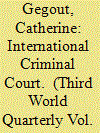|
|
|
Sort Order |
|
|
|
Items / Page
|
|
|
|
|
|
|
| Srl | Item |
| 1 |
ID:
174651


|
|
|
|
|
| Summary/Abstract |
Will the rise of China, an authoritarian, party-state with a poor record of protecting its citizens’ human rights, undermine humanitarian intervention? This question has been particularly pertinent since China’s “assertive turn” in foreign policy. Drawing on the case of Chinese reactions to the humanitarian crisis in Syria, this article argues that China’s attitude toward humanitarian intervention remains ambiguous and contradictory. While China has at times prevented the UN Security Council from threatening sanctions on Syria, it has not necessarily denied that a humanitarian crisis exists. The article shows that the People’s Republic of China is beginning to act more as a norm maker than norm taker, and is offering its own vision of humanitarian intervention, coined as “responsible protection.”
|
|
|
|
|
|
|
|
|
|
|
|
|
|
|
|
| 2 |
ID:
123523


|
|
|
|
|
| Publication |
2013.
|
| Summary/Abstract |
The International Criminal Court ( icc ) aims to promote not only justice, but also peace. It has been widely criticised for doing neither, yet it has to contend with some severe structural and political difficulties: it has limited resources, it faces institutional restrictions, it is manipulated by states, and it is criticised for an alleged selectivity in the way it dispenses justice. However, the icc could contribute significantly to the promotion of international justice and peace, and have a major impact on the prevention of crime, since its prosecutions represent a clear threat to highly placed individuals who commit serious crimes. While this article concentrates on the work of the icc in Africa, the only continent where it has issued indictments against suspected criminals, it also looks at its efforts on other continents. It argues that, in the larger international context, the contribution of the icc to international justice and peace depends on its institutional power and the support it receives from states, on its own impartial work, and on the way it is perceived by potential criminals and victims in the world.
|
|
|
|
|
|
|
|
|
|
|
|
|
|
|
|
| 3 |
ID:
149439


|
|
|
|
|
| Summary/Abstract |
This article analyses the impact of European Union (EU) policies in the field of fisheries on development in Africa. It contests the premise that the EU promotes local economies, and argues that it often contributes to depleting fish stocks, distorting African economic policies and harming fishers’ communities. In so doing, the EU is violating its basic duty to avoid harm to other states. However, it is now committed to sustainable development. This article offers suggestions on policies which would enable the EU to take on both its negative and positive duties.
|
|
|
|
|
|
|
|
|
|
|
|
|
|
|
|
| 4 |
ID:
087830


|
|
|
|
|
| Publication |
2009.
|
| Summary/Abstract |
Western policy towards the Democratic Republic of Congo (DRC) throughout the 1996-2006 period can be understood within a realist framework. Consequently, the West has generally had a counterproductive effect on DRC internal politics. The desire to create and defend Western zones of influence in Africa had a negative impact on conflict resolution until 1997. Following this and until the setting up of a transitional government in 2003, Western inaction and neglect meant that the West was quasi-absent from the negotiations to end the war. Between 2003 and the elections of 2006, the desire to consolidate the EU as a credible actor had an impact on DRC security through the EU's support to the DRC state and to UN peacekeeping missions, but this was limited in time and space.
|
|
|
|
|
|
|
|
|
|
|
|
|
|
|
|
|
|
|
|
|